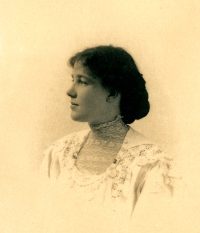HERE we are. The long journey of forty-six days is ended and we are anchored in Manila Bay, two and a half miles from the shore. At this distance the city is only a shining white line between the blue water and the bluer sky. Hot? You never imagined the real meaning of that word, and yet the thermometer marks only ninety-nine; the moist atmosphere makes it seem many degrees higher. Thin clothing and excitement are helping us to bear the heat, for there is a sense of exhilaration in the thought that we are at last in Oriental America.
We slept on deck last night to be ready for the sight of land at the first glimmer of daylight. At four o’clock I was up and dressed watching the faint outlines of the coast range. The sky was cloudless and the sea like glass. The atmosphere was suffused with the soft dove color tinted with pink which precedes the break of day. Even at that early hour the air was tepid. As we approached the bay, on our left the headlands rose gradually to the Mariveles Mountains: on our right the coast line was low. Almost dividing the entrance to Manila Bay stood Corregidor Island. Vessels usually go in by the Boca Chica, or small mouth, to the north of Corregidor. The American squadron passed in through the Boca Grande, or big mouth, on the memorable first of May. We could see the small island from which the Spanish batteries fired futile shots as Dewey stole by in the darkness. Cavite and the spars and hulls of sunken Spanish warships were pointed out to us by Mr. Worcester, who apparently feels as if he were on his native heath again. The sun rose, a great red ball of fire, and we felt its penetrating rays before it had left the horizon. We came to anchor at half past seven.
At nine o’clock a big steam launch came alongside bringing a large delegation of Filipinos to welcome the Commission. We all crowded to the rail for the first glimpse of our new fellow-citizens. They stood on the deck of the launch as it approached, smiling and .raising their hats and waving their hands with the unAnglo-Saxon gesture used in greeting by all the Latin races. They were dressed in frock coats with high hats, and under
the tropical sun I could imagine no more uncomfortable or unsuitable dress. In a few moments they came on board; the judges of the Supreme Court, leaders of the pro-American Filipinos, and a number of ex-members of Aguinaldo’s Malolos Cabinet. Their manners struck me at once as noticeably polished. They were not handsome, but were as intelligent looking a party of men as one would meet anywhere. They reminded me strongly of the Mexicans in face and figure. All spoke Spanish, several had a good knowledge of French, and one or two of the younger men knew a little English. After the introductions were over, the President of the Commission made a speech of welcome, which the Secretary of the Commission interpreted. His rendering of Judge Taft’s cordial Anglo-Saxon greeting to our Filipino friends was a masterpiece. It had all the elegance and stateliness of the grand Spanish manner and yet conveyed the impression of being sincere and from the heart. The delegation was evidently immensely pleased with its reception. I met several of the judges and a physician who had played a conspicuous part in the insurrection, but who now are apparently in sympathy with the Americans. They were lively and enthusiastic, a likeable type.
There has been a continual coming and going all day long of American officials and army officers. After luncheon the Commission returned the military governor’s call. They reported an escort of soldiers and all the adjuncts of a military reception. Their only comment on the affair was, ” hot.” It is now nearly ten o’clock in the evening. The stars seem larger in America, but the Southern Cross is not as wonderful as poets and romancers make it.
Looking toward the land the lights twinkle along shore and on the Luneta, which ” our oldest inhabitant,’ as we call Mr. Worcester, has just pointed out to us. To-morrow we shall go on shore to select the houses available for our use.
